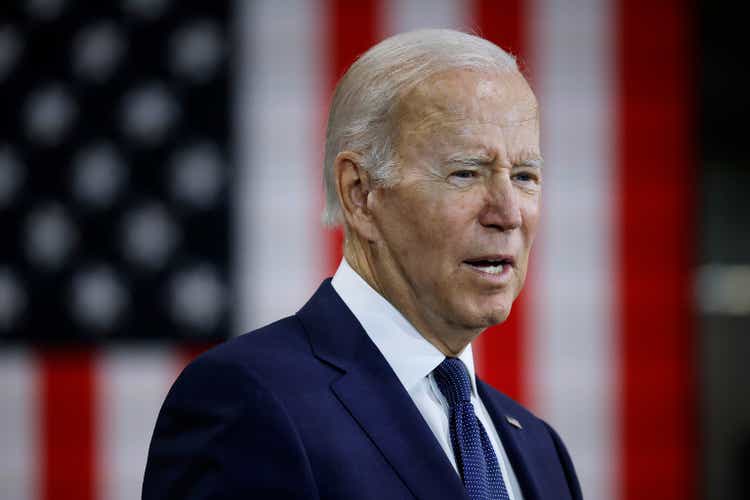Chip Somodevilla/Getty Images News
Twitter, Inc. (NYSE:TWTR) is down massively in pre-market trading as there’s been a Bloomberg report saying:
“Biden administration officials are discussing whether the US should subject some of Elon Musk’s ventures to national security reviews, including the deal for Twitter Inc. and SpaceX‘s Starlink satellite network.”
In my opinion, this opens up an opportunity to add to a Twitter position at very low prices. These discussions seem to have borne out of Elon Musk’s recent meddling in Russia’s war on Ukraine. Officials are (according to Bloomberg) worried about his pro-Russian stance. In addition they are worried about (the money quote):
They are also concerned by his plans to buy Twitter with a group of foreign investors.
The deal for Twitter is funded by Elon Musk, a group of equity investors, and a debt package from a group of banks. The equity portion of the deal includes the parties government officials are worried about, according to Bloomberg:
“Prince Alwaleed bin Talal of Saudi Arabia, Binance Holdings Ltd. — a digital-asset exchange founded and run by a Chinese native — and Qatar’s sovereign wealth fund.”
To offer some perspective, Musk is putting up $33.5 billion. This latter group of investors is putting up $7.1 billion. This group includes Saudi Prince Alwaleed bin Talal Al Saud, who is rolling over his current stake worth $1.9 billion. Note that he already owned Twitter before this deal came to fruition. This is not a new thing.
Note that I’m not a lawyer or law professional. Having said that, according to the merger agreement, Musk is on the hook for the entire equity portion. If pieces of the equity financing fall through, Musk needs to find a way to cover the shortfall. Maybe he’s already trying to get some new investors in as he seemed to be back to the promoter playbook on the most recent Tesla’s earnings call.
The Bloomberg article talks a lot about SpaceX as well. I can imagine the U.S. government wants to put Elon Musk under some scrutiny or put some informal pressure on him not to mess with U.S. geopolitics.
Some people will argue Elon Musk is trying to deliberately blow up his Twitter deal through his Russia/Ukraine shenanigans and even by more prominently talking about China. Under this theory, he would hope to get some kind of enemy of the state label making him unfit to own a social media outfit like Twitter. Per Bloomberg:
The discussions are still at an early stage, the people familiar said on condition of anonymity. Officials in the US government and intelligence community are weighing what tools, if any, are available that would allow the federal government to review Musk’s ventures.
Given that the discussions are at an early stage, I would not be surprised if some diplomatic explanations by Musk could limit the extent of these investigations. As far as mergers and acquisitions go (specifically applicable to the Twitter situation), the obvious possibility is the law governing the Committee on Foreign Investment in the United States aka CFIUS. This is intended to be used to check on foreign investments within the United States. Perhaps CFIUS could make it more difficult for Musk to close with his current co-investors, but I don’t think they can stop a U.S. citizen from acquiring a U.S. business. Here’s how law firm Cooley describes their jurisdiction:
CFIUS is empowered to conduct national security reviews of “covered transactions,” which regulations define as a proposed or pending “transaction” with any “foreign person” which could result in “control” of a “US Business” by a foreign person.
- A “transaction” is broadly defined to include mergers, acquisitions, joint ventures, leases, and other investments.
- A “foreign person” can be a foreign national, foreign government, or foreign entity, including a partnership, corporation, trust, or other entity organized abroad.
- A “US business” is any entity engaged in interstate commerce in the United States.
- “Control” is defined broadly as the power – whether or not exercised – to directly or indirectly determine, direct, or decide important matters affecting the US business.
In the context of a merger, acquisition, or other investment involving a foreign interest, these broad regulatory definitions can require careful analysis to determine whether CFIUS review is warranted or likely.
A CFIUS review wasn’t anticipated in the merger agreement indicating how unlikely it seemed.
It also seems far-fetched to me that Elon Musk would risk being labeled some kind of enemy of the state. This puts his many (much more valuable) other ventures at risk. Many of his ventures rely heavily on access to financing and/or government subsidies directly or indirectly. In particular, SpaceX is heavily reliant on government contracts.
Importantly, the deal closing and some kind of government investigation into Musk and Musk’s ventures are not mutually exclusive. Musk is responsible for getting the equity portion of the Twitter financing together, even if this results miraculously in some kind of government intervention to block this deal. Which seems highly unlikely to me. We would likely see Twitter arguing Musk deliberately caused or pursued this block and suing him for damages.
Taking everything together, I couldn’t resist adding to my Twitter position at $47.64 per share. This leaves 13.76% upside to the deal price. I expect the spread will close rapidly and plan to resize my position back down if that does occur.


Be the first to comment